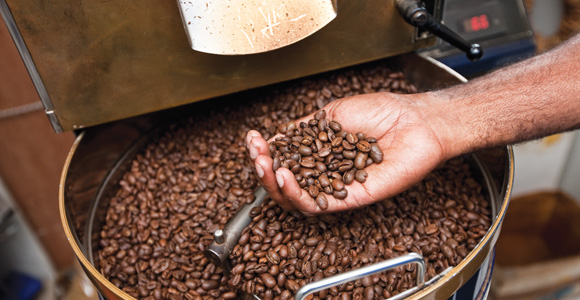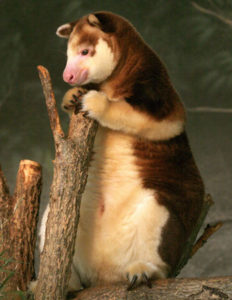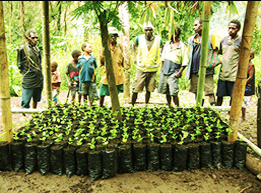The interests of commerce and environmentalism are being aligned on Papua New Guinea’s Huon Peninsula. Local villagers have become involved in saving tree kangaroos by growing coffee and exporting it to the United States, reports Brian Johnston.

Coffee roasting. Credit: Pacific Islands Trade & Invest
Researchers in Morobe Province, Papua New Guinea, have come up with a seemingly counter-intuitive plan to protect the endangered Matschie’s, or Huon, tree kangaroo. They have set up a protected area—standard in the conservation world—but then encouraged local villagers to ‘exploit’ it by growing coffee.
The tree kangaroos are thriving, the locals have an income source, and the coffee is now being sold on the other side of the Pacific, in the cafes of Seattle, USA.
‘Roo and brew

The Matschie’s, or Huon, tree kangaroo.
The story starts in 2009 with the establishment of the YUS Conservation Area, named for three rivers (the Yopno, Uruwa and Som) in a remote region of the Huon Peninsula, near Lae.
The Huon Peninsula provides critical habitat for several species, including the remarkable tree kangaroo.
Some 12,000 villagers inhabit 35 villages in the YUS region, so it was vital that they could draw sustainable benefits from the conservation area.
The solution was to create a strongly protected core in this mountainous landscape, surrounded by more flexible, mixed-use buffer zones that local communities could put to environmentally-friendly use.
Farming
Small-scale farming was one such use, and already practiced across the Huon Peninsula. But coffee growing wasn’t necessarily the obvious choice of crop.
Coffee farming had been tried and abandoned in the 1950s because of the challenges of transporting the product to market from this rugged, roadless region.
‘It seemed like an absurdly ambitious plan.’
The only way to absorb the high cost of transport by light plane was to sell internationally, at a premium.
It seemed like an absurdly ambitious plan, but Woodland Park Zoo had a fortuitous advantage in hometown Seattle, the coffee capital of the US and a world centre for coffee roasting and supply.
Farm direct
Enter Caffe Vita Coffee Roasting Company, founded in Seattle in 1995, and one of the pioneers of the ‘farm direct’ movement that seeks to develop long-term, mutually beneficial, relationships between farmers and businesses.
It was already dealing with small-scale, sustainable coffee growers in far flung places, and quickly became interested in the idea of YUS coffee.
‘Some 400 families were trained in coffee farming and processing.’
‘Caffe Vita stepped up not only to provide the structure and market support, but they even came with us to Papua New Guinea to meet the farmers, train them in coffee cultivation techniques and help them improve their product to the sensibilities of the gourmet Seattle coffee market,’ explains Dr Lisa Dabek, director of the Tree Kangaroo Conservation Program (TKCP).
 The YUS Conservation Coffee Project thus became a joint effort between conservation groups: PNG’s Coffee Industry Corporation and Caffe Vita.
The YUS Conservation Coffee Project thus became a joint effort between conservation groups: PNG’s Coffee Industry Corporation and Caffe Vita.
Some 400 families were trained in coffee farming and processing, and improved drying conditions for the coffee beans were established.
‘The farmers of YUS have shown remarkable progress toward implementing the changes necessary to improve yields, and, more importantly, the quality of their coffee,’ comments Daniel Shewmaker, Caffe Vita’s coffee buyer.
Higher earnings
In early 2012, the first 22 bags of coffee were shipped to Seattle and sold both in drink form and as beans for retail sale.
Better technical knowledge and access to an international market have seen villagers’ earnings increase 60 per cent since the inception of the project.








Speak Your Mind